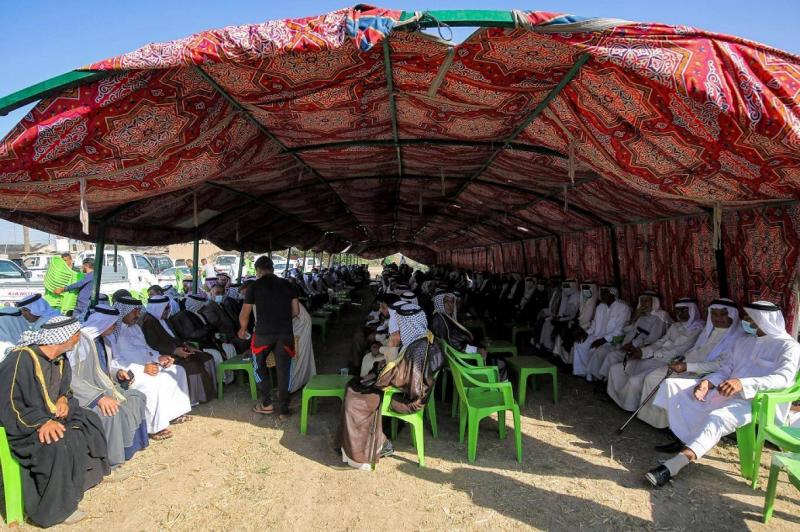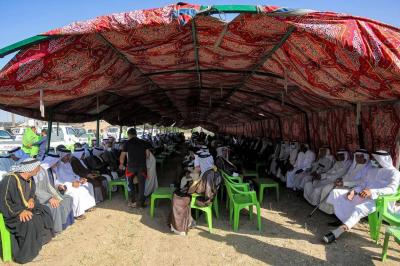The saga of armed tribal disputes continues, particularly in central and southern Iraq, with the latest being an armed tribal conflict in the Al-Haideria district within Najaf province, which resulted in the deaths of two individuals and left dozens more injured, including two security personnel. Three houses were burned during the incident, and firefighting units attempting to extinguish the fires were targeted to force them to withdraw from the scene, although they managed to put out the flames before they spread further.
#### Historical Context
Iraqi tribes play a significant role in the social and cultural identity of the country. Tribes are recognized as social organizations based on kinship and clan structures, consisting of large groups of interrelated families under the authority of a tribal chief. They play an essential role in organizing community, political, and economic life in traditional Iraqi societies and have significantly influenced the modern history of Iraq. Typically, tribal structures emphasize social solidarity and mutual support among members, fostering tribal loyalties that may sometimes overshadow national allegiance. While tribes can contribute positively to stability and conflict resolution within Iraqi communities, they may also present security or political challenges when they conflict with central authorities or are exploited for political or military purposes. It is noteworthy that Iraqi tribes have a long and complex history, with variations in organization and practices across different regions in Iraq.
#### Security Challenges
A security expert suggests that corruption within police departments and the solicitation of bribes for processing citizens' complaints have led citizens to prefer filing grievances with tribal leaders instead of state institutions, as these leaders are perceived to resolve issues and disputes outside the legal framework. A legal expert argues that applying the law promotes deterrence and social justice and emphasizes that enforcing the law is one of the primary responsibilities of law enforcement agencies. However, he points out that tribal customs, administrative and financial corruption, and the need for several laws to be updated to align with changing realities in Iraq hinder this process.
#### Disregard for Law and State
Security expert Jalil Khalaf states that "tribal disputes indicate a disregard by some tribes for the law and the state" and that they use weapons openly, including medium and heavy arms, without fear of legal repercussions. This situation threatens societal peace and instills fear among citizens periodically. Khalaf believes the state is incapable of curbing this escalating phenomenon among some tribes and criticizes certain tribal leaders for their role in this issue. He highlights that citizens avoid filing complaints with police stations due to the expectation of being asked for bribes and the potential financial burden placed on both the complainant and the accused, deterring them from pursuing legal recourse and opting for tribal mediation instead.
The security expert believes that "citizens avoid police stations because they know they will lose more than they gain and that the resolution of their cases will take a long time, compounded by a lengthy list of demands and requirements" leading them to approach tribal chiefs instead. He hopes that the Interior Minister will address these issues to significantly reduce tribal conflicts.
Local media reported that a tribal conflict erupted last Wednesday morning between two tribes in Al-Haideria, northern Najaf, involving the use of medium weapons and resulting in two fatalities before a large security force was deployed to regain control and investigate the causes.
The Al-Haideria conflict resulted in the burning of three homes belonging to the tribe responsible for killing a member of the opposing side, and members of the civil defense narrowly escaped an assassination attempt after coming under fire while trying to extinguish the burning houses. The conflict also led to the injury of two security personnel during attempts to quell the tribal dispute.
#### Weapon Proliferation
Across Iraq, home to a population of approximately 40 million, 40% of whom are under 14 years old, around 7.6 million light weapons are reportedly in circulation, according to a survey conducted in 2017. The actual number of unreported weapons could be substantially higher.
Tribal weaponry is not limited to light firearms; they also possess rockets, machine guns, armored vehicles, and other heavy arms that are sometimes used during tribal conflicts, leading to prolonged disputes that can last for years. Tribal conflicts in southern and central Iraq are considered one of the foremost security issues facing these regions, marked by intermittent armed confrontations resulting in casualties among various tribes, primarily over land disputes and water shares, often employing medium arms and shoulder-fired rockets.




